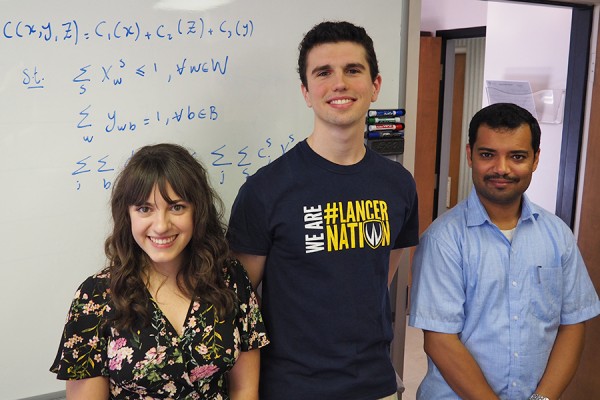 Students Tatiana Krikella, Jordan Kiss, and Tareq Oshan are applying their mathematics skills to model the supply chain network of a distribution company.
Students Tatiana Krikella, Jordan Kiss, and Tareq Oshan are applying their mathematics skills to model the supply chain network of a distribution company.
A partnership with Canada’s market leader in wholesale product distribution will provide real-world application of mathematics for students at the doctoral, masters and undergraduate levels.
A team of UWindsor researchers under the leadership of professor Richard Caron is building an interactive software model to map a supply chain network for Wolseley Canada Inc., helping the company plan for future infrastructure initiatives.
“Partnerships like the one we have with Wolseley are critical for helping our students understand the real-world applications of their education and how they can leverage their knowledge and skills to make an impact in the business world,” says Dr. Caron, head of the Department of Mathematics and Statistics.
He and his students will create a digital model of Wolseley’s distribution network using information about the company’s points of supply chain contact, the locations of major highways and rail lines and other data. The completed project will result in a detailed, interactive model of the company’s supply chain operations.
“Our students are excited to see the final result, and we’re looking forward to seeing how our work will help Wolseley achieve its business goals,” Caron says.
Tatiana Krikella will enter fourth-year studies in mathematics and statistics in September. She says the research team recently presented its findings to-date to Wolseley officials at its distribution office in Milton, Ontario.
“Going to Wolseley and presenting to big business was both exciting and nerve-wracking, but it turned out well and one of execs called the work of my friend Jordan (teammate Jordan Kiss) ‘gold’, so that felt pretty good,” says Krikella. “It has been a great experience working on a real-life project, and getting to know the application of math in the real world.”
Caron received a six-month, $25,000 Engage grant from the Natural Sciences and Engineering Research Council of Canada (NSERC) to help pay for the project. Engage grants are intended to foster the development of new research partnerships by supporting short-term research and development projects aimed at addressing a company-specific problem.
“The grant provides salaries to the students so that we can not only do the work, but also provide meaningful engagement opportunities,” says Caron.
He expects to complete the project in November.
